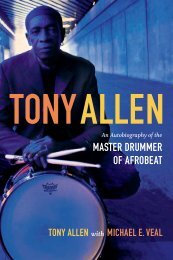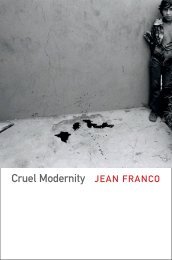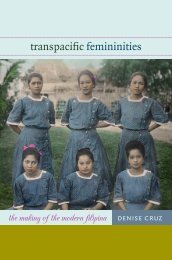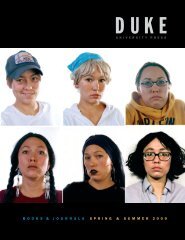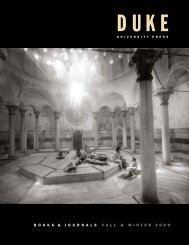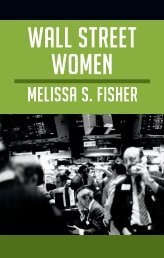Spring 2013 Catalog - Duke University Press
Spring 2013 Catalog - Duke University Press
Spring 2013 Catalog - Duke University Press
You also want an ePaper? Increase the reach of your titles
YUMPU automatically turns print PDFs into web optimized ePapers that Google loves.
Dying Modern<br />
A Meditation on Elegy<br />
diana fuss<br />
POETRY/LITERARY CRITICISM<br />
general interest<br />
In Dying Modern, one of our foremost<br />
literary critics inspires new ways<br />
to read, write, and talk about poetry.<br />
Diana Fuss does so by identifying<br />
three distinct but largely unrecognized<br />
voices within the well-studied genre<br />
of the elegy: the dying voice,<br />
the reviving voice, and the surviving<br />
voice. Through her deft readings<br />
of modern poetry, Fuss unveils<br />
the dramatic within the elegiac: the<br />
dying diva who relishes a great<br />
deathbed scene, the speaking corpse<br />
who fancies a good haunting,<br />
and the departing lover who loves<br />
a dramatic exit.<br />
Focusing primarily on American and British poetry written during the past two<br />
centuries, Fuss maintains that poetry can still offer genuine ethical compensation,<br />
even for the deep wounds and shocking banalities of modern death.<br />
As dying, loss, and grief become ever more thoroughly obscured from public<br />
view, the dead start chattering away in verse. Through bold, original interpretations<br />
of little-known works, as well as canonical poems by writers such as<br />
Emily Dickinson, Randall Jarrell, Elizabeth Bishop, Richard Wright, and Sylvia<br />
Plath, Fuss explores modern poetry’s fascination with pre- and postmortem<br />
speech, pondering the literary desire to make death speak in the face of its<br />
cultural silencing.<br />
“Celebrating poetry’s power to bring anything, even death, to life, Diana Fuss’s Dying<br />
Modern reanimates the elegy for our time. Bringing out the ethical call that echoes<br />
throughout the form, her voice becomes the perfect guide to the vanishing voices that<br />
elegy creates, preserves, and displaces at once. After reading this wonderful book you’ll<br />
agree: death never had it so good.”—LEE EDELMAN, author of No Future: Queer Theory<br />
and the Death Drive<br />
April 128 pages paper, 978–0–8223–5389–8, $21.95/£14.99 cloth, 978–0–8223–5375–1, $74.95/£56.00<br />
Diana Fuss is Louis W. Fairchild<br />
’24 Professor of English at Princeton<br />
<strong>University</strong>. She is the author of The<br />
Sense of an Interior: Four Writers and<br />
the Rooms that Shaped Them, winner<br />
of the James Russell Lowell Prize;<br />
Identification Papers; and Essentially<br />
Speaking and the editor of Human, All<br />
Too Human; Pink Freud; and Inside/Out.<br />
“Diana Fuss’s exceptional meditative essay, Dying Modern,<br />
is a subtle Keatsian inquiry into the irresolvable, and therefore<br />
generative, tensions between genre and mode, and<br />
between historical contingency and the constancy of ethical<br />
commitments.”—MAX CAVITCH, author of American Elegy:<br />
The Poetry of Mourning from the Puritans to Whitman<br />
“Dying Modern is terrific. To have achieved so much in<br />
such a short, brisk, and eminently readable book; to have<br />
recovered such fascinating subgenres and thought through<br />
their interrelations; to have returned to the well-worn terrain<br />
of the elegy and come up with fresh insights and inventive<br />
readings—these are remarkable accomplishments.”<br />
—JAHAN RAMAZANI, author of Poetry of Mourning:<br />
The Modern Elegy from Hardy to Heaney<br />
7



